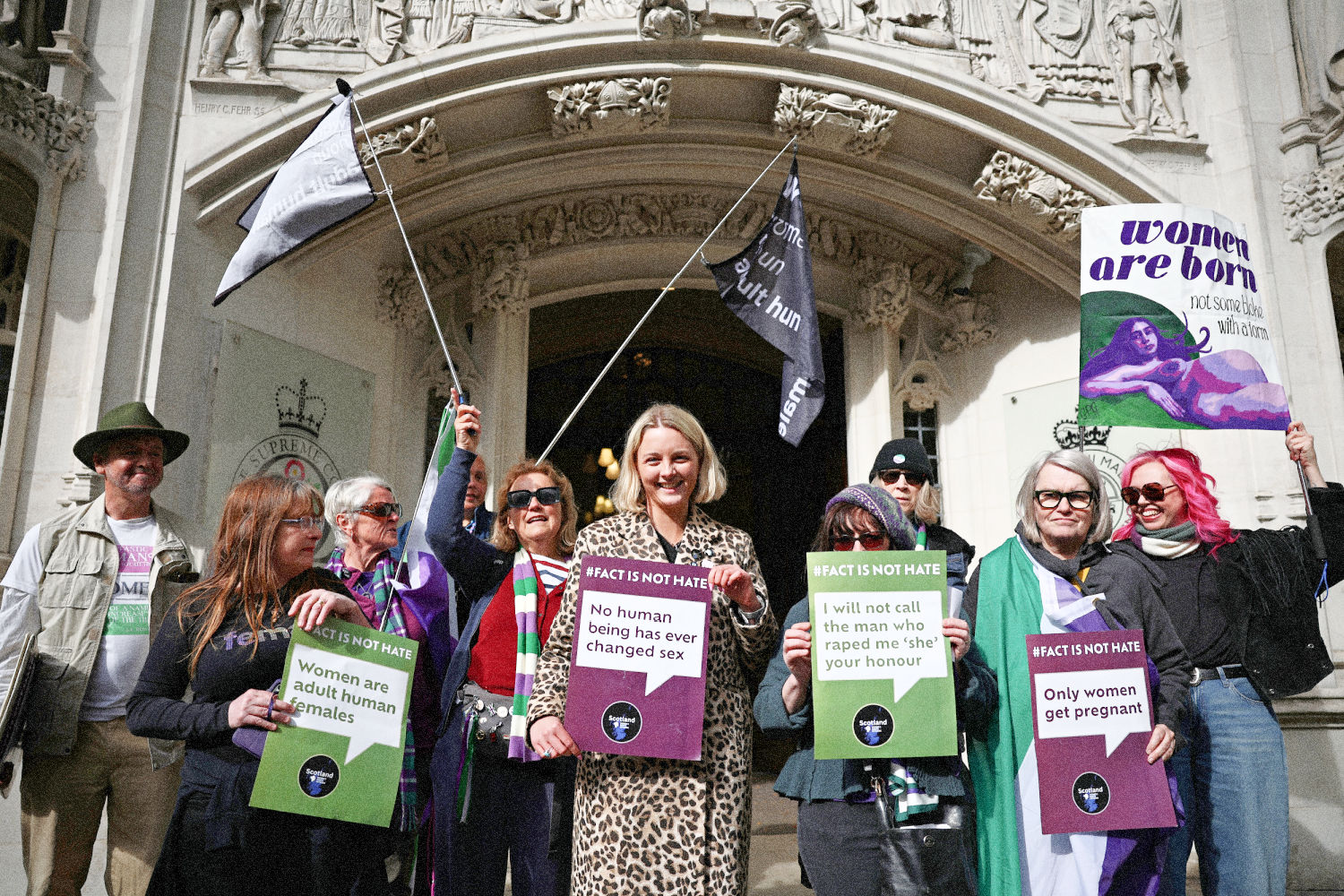End of the rainbow: Pride’s fall can’t come soon enough

Is Pride flopping? This parti-coloured celebration of all things LGBTQIA+ started half a century ago as an afternoon’s little march for lesbians and gay men. Then it became a day, then a week, then a month, and now it spreads throughout the summer, accompanied by all manner of feast days and ‘visibility’ events. Its expansion coincided with the addition of all the letters after the first three. This is when it became a jamboree not only of boring homosexuality – very old hat – but just about anything else that its purveyors consider unconventional, ranging from wearing wigs to not fancying any kind of sex at all. Every peccadillo was deemed worthy of a flag and a float.
But the wheels finally seem to be coming off the Pride clown car. What was mushrooming is now shrivelling. Several newly Reform-led councils – including Kent and Durham – have taken down Pride flags from their municipal properties and won’t be flying them during the high days, or any others. The Times reports that Whitehall has banned civil servants from buying Pride lanyards. This is supposedly part of a ‘crackdown on waste’ – but it’s conveniently timely.
Pride events themselves are dissolving. Several celebrations during Pride Month, which begins on Sunday, have faced financial difficulties. Lincoln, Plymouth, Southampton and Hereford have all either been abandoned, cut back, or had to rely on emergency bailouts from wealthy private backers. ‘Many of our usual sponsors are unfortunately unable to help due to budget constraints,’ the organiser of Lincoln Pride told the BBC last month. His counterpart in Worthing reported that ‘he had unsuccessfully been trying to secure sponsorship since September and warned the event might be cancelled unless that changes’. Plymouth Pride was axed altogether – its website tells us that ‘despite our best efforts, the lack of national and local funding, alongside a decline in volunteer support, has made it impossible to deliver the event this year’.
Nobody knows how much these shortfalls have to do with the Trump administration’s shuttering of USAID. But it’s a very strange coincidence if not. It is known that the American taxpayer was unwittingly partly funding Pride events in Britain, such as ‘Classical Pride’, a series of concerts in London which celebrates the ‘importance of LGBTQ+ music and musicians to classical music’.
America has seen many of Pride’s biggest corporate sponsors withdrawing their cold tootsies from the rainbow sock. Mastercard, Citi, PepsiCo, Nissan, PricewaterhouseCoopers, Booz Allen Hamilton, Deloitte, Comcast, Anheuser-Busch, Diageo and Darcars Automotive have all pulled back from stumping up for celebrations such as Pride St Louis and WorldPride in Washington. San Francisco Pride faced a potential $300,000 shortfall due to these withdrawals; NYC Pride reported an estimated $350,000 deficit. A Gravity Research study noted that around two in five corporate executives planned to reduce Pride engagement this year. With the second coming of Donald Trump,
the shine has come off the rainbow. He’s given executives good cover to walk away.
Back home, the Supreme Court’s ruling on the meaning of sex in the Equality Act (in a case brought by women’s rights charity For Women Scotland) has provided a similar opportunity. This leads us to the major fracture line that’s started to break the whole LGBTQIA+ project apart; the inevitable smash as the ideology of ‘trans’ – what I call genderism – collides with reality.
Many of the bigger Pride events (London, Manchester and Brighton among them) have reacted to the cooling of the government towards ‘trans rights’ by suspending any party political involvement whatsoever – even from still wildly enthusiastic supporters like the Greens and Lib Dems. This seems to be a face-saving exercise, the age-old ‘dump them before they get the chance to dump you’ strategy.
2025 is the year the genderist movement finally started to break apart. It has been a mad, wild ride. I’m sure there’s more to come, but after many false alarms it feels like a corner has finally been turned. The collapsing of Pride under the weight of its own internal contradictions is a sure sign that the jig is up.
The preposterous propositions of Pride are a strain on credulity. Its adherents have to hold so many directly contradictory beliefs in their heads at the same time – for example, that men wearing women’s clothes are utterly hilarious when this is classed as ‘drag’, but worthy of seriousness, respect and indeed genuflection when this is classed as ‘trans’. Following the Supreme Court ruling, we hear that one of the main reasons men want access to women’s toilets is because if they don’t get it, butch lesbians will be assaulted by vigilante women when they go in there. Permitting trans women to use the ladies’ will, apparently, make everyone safer. If it does your nut in even hearing this blather, heaven knows the brain ache it must give to those pretending to believe in it.

The ruling has brought the Pride complex down to earth with a thump, but even so its supporters are trying to bargain with the simple truth delivered by the Supreme Court. This is being done in the time-honoured ‘soft Brexit’ style – often, tellingly, by the same people, e.g. Baroness Hale and Nicola Sturgeon. They are pretending not to understand the ruling, looking for loopholes, trying to delay it and ‘both sides’ it.
Humza Yousaf, the former first minister, now says that the Scottish National party’s disastrous self-ID policy – which would have allowed people to change their legal sex without a medical diagnosis – was merely ‘handled’ badly. As infuriating as such grudging retreats from politicians are, they are another signal that the tectonic plates under Pride are shifting.
But we must not forget that nearly all institutions, both public and private, are still impaled on the high heel of genderism. In particular, terrestrial TV news remains in the firm grip of a very small, but very loud and intimidating, cadre of gender activists. One of the main reasons why the rainbow cult got so far was that the media didn’t do its job.
I know from experience that people often refuse to believe you when you tell them the plain facts about this period. Because you can’t possibly be telling the truth – it would have been on the news! There can’t really have been a rainbow dildo butt monkey invited to rampage around a school library and promote reading to young children (as there was in 2021). There can’t have been a thousand titles won by men competing in women’s sports.
And the media still isn’t doing its job. If I were to tell you, for example, that Pride In Surrey, which last year was given £24,000 of taxpayers’ money from the council, was founded by a man who is now serving a sentence for child rape, and hosted a gig by a man convicted of attempted murder, you wouldn’t believe me. Or that there was a message posted the other day on Police Scotland’s official internal intranet that directly compared the gender critical movement to the Nazi party. How about that? Not news, apparently.
On one level, it’s all been strangely entertaining, as a kind of Grand Guignol spectacle of human irrationality. But as Pride falls, it’s time to confront the horrors that the rainbow masked. As Helen Joyce, advocate for Sex Matters, said in a recent interview: ‘There are a lot of people who can’t move on – the people who have transitioned their own children. Those people are going to be like the Japanese soldiers who were on Pacific islands and didn’t know the war was over… [They] have done the worst thing that you could do, which is to harm their children irrevocably… So those people will still be fighting.’
Five years on, the manias around Black Lives Matter and lockdowns have dissipated. It is almost dizzying how swiftly the response to Covid has vanished from the discourse. But both of those neurotic outbursts have the advantage that they were fairly swift and thus fairly easily memory-holed.
It’s possible that Pride and LGBTQIA+ might go the same way, dropping off in bits, forgotten along with other embarrassing crazes like deely-boppers and people thinking Gary Barlow was sexy. I fear not. The frenzy has been too long, too protracted. I think it will need a direct, committed, top-down directive to really, finally, stop it.
A Reform administration – or any other – will have to be fully committed to the serious work of snuffing it out for good. A flag removal policy is a good first sign, but they will have to tough this one out, expunging genderism from the institutions – police to universities to courts – all while avoiding the rainbow-coloured bricks that will certainly be thrown their way. Pride may be dying, but it won’t lie down.





















